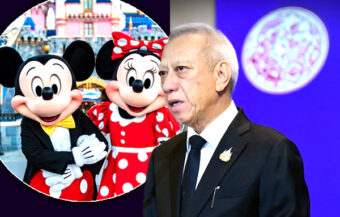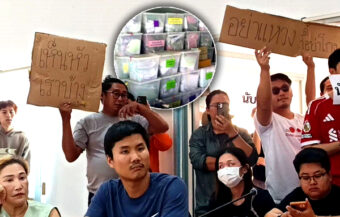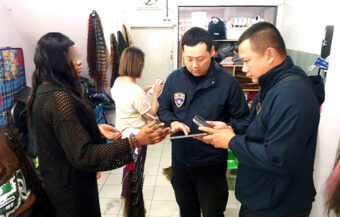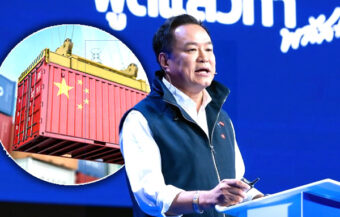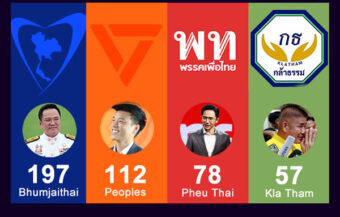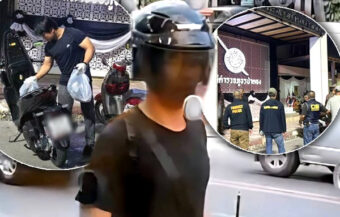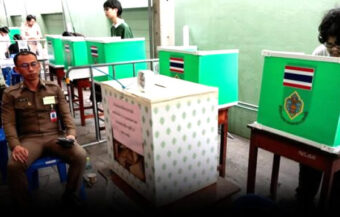Thai immigration chief strongly rejects Reuters claims that officers aided traffickers at Bangkok airport, calling the report sensationalist and unverified, urging all media to submit credible evidence before making accusations against Thailand’s authorities.
A senior Thai Immigration Bureau officer on Saturday forcefully rejected the central claims of a Reuters exposé that accused his office of colluding with Myanmar-based scam centre gangs at Suvarnabhumi Airport in Bangkok. The sensational report included comments from Kenya’s Ambassador to Thailand, Lindsay Kiptiness, alleging that several Kenyan nationals had fallen victim to these criminal networks. Major General Cherngron Rimpadee, Commander of Immigration Division 2, delivered a detailed and pointed rebuttal, dismantling the report’s claims. Thai officials have also urged the Kenyan ambassador to submit an official report backed by verified evidence, ensuring the matter can be properly investigated and not treated as unverified speculation.
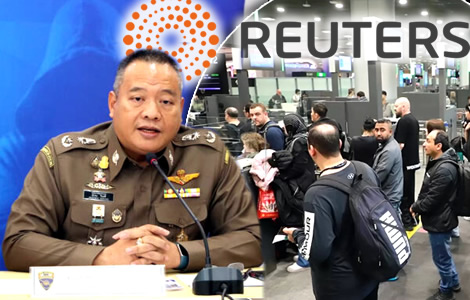
In what is the second serious media challenge for Thailand in as many weeks, a Reuters investigation has compelled a senior police officer to issue a public rebuttal. This follows the Thai government’s strong reaction last week to a BBC documentary series. Officials described that series as both sensationalist and distorted. Many British tourists and long-term UK expatriates protested loudly at a 3 part series exposing Thailand’s notorious sex industry. They felt the BBC’s portrayal of Thailand was misleading, disrespectful, and harmful to the country’s image. Now, Reuters is being accused of promoting a similarly unfair and exaggerated narrative.
The Reuters multimedia report alleges serious misconduct by officers of the Thai Immigration Bureau. It claims foreign visitors arriving at Suvarnabhumi Airport in Bangkok were abducted by traffickers with help from immigration officers.
Reuters alleges Immigration officers facilitated abductions at Suvarnabhumi airport for scam centres
These tourists were then allegedly transported to Mae Sot, a border town near Myanmar. From there, the report claims, victims were smuggled across the border and forced into slavery at scam call centre compounds. The allegations form part of a larger investigation into cyber scam syndicates operating in Southeast Asia.
A central figure in the Reuters story is “Oly,” an East African man described as an IT consultant. He claims he flew to Bangkok from Ethiopia in November 2024. According to the report, upon arrival, his passport was examined by a female Thai immigration officer.
He then alleges that she handed him over to someone pretending to be hotel staff at the baggage claim area. Oly says he was driven away in a car, fell asleep during the journey, and woke up in Mae Sot.
There, he says, he was handed over to traffickers and taken across the border into Myanmar. He was then forced to work in a cyber scam centre operated by criminal networks.
However, Thai police officials say the story lacks credibility and is not backed by any verifiable evidence. On Saturday, Major General Cherngron Rimpadee, Commander of Immigration Division 2, addressed the claims directly at a press conference.
Immigration chief reviews records and rejects Reuters claims of alleged trafficking through Bangkok
He stated that his office conducted a detailed review of immigration records from November 2024. They searched for any entries involving a person named “Oly” or close variants. While 62 entries matched that name, only two were from African countries: one from Uganda and another from Kenya. None were Ethiopian nationals, and no entries matched the profile described by Reuters.
Moreover, Cherngron emphasized that access to restricted baggage areas is highly controlled. Only airport employees and immigration officers with clearance may enter. Even senior immigration personnel require special passes.
Hotel staff are not allowed in those areas under any circumstances. Therefore, the claim that someone posing as hotel staff collected a tourist from baggage claim is, according to him, implausible.
He also questioned the idea that a traveller could be abducted and driven eight hours across Thailand without noticing.
According to Oly, he fell asleep during the journey and only woke up near the border. Cherngron said it stretches credibility to believe a person would not realise they were being kidnapped, especially during such a long drive.
Missing evidence and logistical gaps cast serious doubt on the credibility of Reuters allegations about Thailand
He added that no CCTV footage, phone logs, or audio recordings were presented to support the claim. In his view, the absence of hard evidence severely weakens the core of Reuters’ report.
Reuters quoted Kenya’s Ambassador to Thailand, Lindsay Kiptiness, in support of its findings. Kiptiness claimed that multiple Kenyan nationals had described similar trafficking experiences through Thai airports.
Nevertheless, Thai foreign affairs officials responded that the Kenyan embassy has not submitted any official reports or credible documentation to back those allegations.
A spokesperson from Thailand’s Ministry of Foreign Affairs confirmed that the government is fully willing to investigate any legitimate complaint. However, as of now, no verifiable evidence or legal filings have emerged that support the Reuters account.
Meanwhile, Thai immigration authorities shared extensive details about their anti-trafficking efforts. Since January 2025, they reported having denied entry to more than 16,538 individuals. Most of these travellers came from countries in South Asia and Africa, flagged as high-risk.
Thailand explains proactive entry screening and monitoring measures to prevent trafficking of visitors
Travellers who lacked return tickets, had vague or suspicious itineraries, or who had previously entered Thailand via Myanmar or Cambodia were particularly scrutinised. These individuals were either turned away or required to undergo interviews.
Additionally, more than 5,278 travellers identified as potentially vulnerable were interviewed at length by immigration officers. Their personal information and contact details were recorded. They were also given formal warnings about trafficking risks and how to avoid exploitative situations. Thai authorities say these measures demonstrate a firm and proactive approach to preventing trafficking.
Officials also discussed cases involving foreigners who had been rescued from scam operations in Myanmar and Cambodia. While many claimed to be victims, Thai investigators discovered that some had participated willingly.
Others had cooperated under threat or pressure. As a result, the Immigration Bureau created a database of those individuals. Some are now barred from re-entering Thailand. According to law enforcement, the distinction between victims and perpetrators is not always clear.
International media bias and old stereotypes create misleading narratives about Thailand’s governance
However, many Thai observers argue that the issue is not only about verifying facts. They say it reflects a deeper and persistent bias within international media. In their view, Western outlets often rely on outdated stereotypes when reporting on Thailand.
Common tropes include a focus on sex tourism, corruption and patriarchal values. These themes, some pundits argue, ignore the country’s efforts at reform and progress as well as its distinct culture. Moreover, they say such narratives reduce Thailand to a caricature.
This approach, they warn, carries diplomatic consequences. International media reports often shape the opinions of foreign governments. In the case of Thailand’s border conflict with Cambodia, for example, several Western media outlets expressed sympathy for the Cambodian position.
Thai diplomats argue that this support was not always based on facts. Instead, they believe it stemmed from preconceived ideas about Thailand. Consequently, Thai officials are forced to spend time correcting misleading narratives instead of addressing real policy issues.
Economic stakes are threatened by unverified media claims affecting tourism and investment confidence
The economic implications are also significant. Tourism remains a major industry for Thailand. If foreign media stories about trafficking or state corruption go unchallenged, travellers may avoid visiting.
Similarly, international investors may become more cautious. Thai authorities say that misleading narratives have the power to damage the country’s economy. They argue that the cost of reputational harm is not merely theoretical but real and quantifiable.
At the press conference, Cherngron made an appeal for better journalistic standards. He urged Thai media outlets not to amplify foreign reports without conducting fact-checks. He also called on international media to exercise caution and responsibility.
According to him, repeating unverified claims harms Thailand’s international standing. He said such stories serve the interests of foreign media companies while hurting the Thai public and the country’s global image.
The Ministry of Foreign Affairs issued a similar statement. It emphasised Thailand’s commitment to transparency and human rights. Officials invited embassies, NGOs, and journalists to provide evidence when making serious accusations.
They also reiterated that the government will act decisively against any officials found guilty of wrongdoing. However, they insisted that justice must be based on facts—not assumptions.
Thailand calls for fair media treatment and evidence-based reporting to ensure accurate global perception
This latest controversy highlights Thailand’s broader request for fair treatment in global media. Officials say they welcome criticism, but only when it is evidence-based. Without facts, they argue, criticism becomes ideological. It becomes a form of narrative warfare rather than a tool for accountability.
In recent years, Thailand has cooperated with regional partners to dismantle scam networks and rescue trafficking victims. However, progress remains fragile. The presence of criminal groups in Myanmar and Cambodia complicates the situation. Thailand says it continues to play an active role in protecting vulnerable individuals. Nevertheless, the government warns that sensational reporting can undermine trust between states and frustrate diplomatic cooperation.
Thai authorities reject Reuters account as inaccurate and call for rigorous verification before publication
Finally, Thai officials reject outright the Reuters account as inaccurate and damaging. They maintain that the evidence does not support the report’s most serious claims. They assert that the story lacks a factual basis and may be built on hearsay.
Furthermore, they say that without documents, names, footage or corroborating witnesses, the accusations remain speculative.
Near arrest claim by BBC presenter rebuffed by top official who explained what happened on Soi Cowboy
Tourism chief rebuts distorted scam centre reports linked to Taiwanese tourists. Now, a new, safer order
Cambodian cybercrime industry run by Chinese criminals could be generating up to 38% of its GDP
Still, they do not deny that trafficking exists. Nor do they deny that some immigration officers may be corrupt. But they insist that such issues require proof before being published globally.
Authorities argue that justice and truth demand more than anonymous sources and shocking headlines. Thailand, they say, deserves scrutiny—but not slander. The country remains open to international media. But it now expects a fairer, more accurate, and more responsible form of journalism.
Join the Thai News forum, follow Thai Examiner on Facebook here
Receive all our stories as they come out on Telegram here
Follow Thai Examiner here
Further reading:
BBC gets a Red Light from viewers & fans of Thailand over the distorted docu-series aired last week
Sex tourism from the United Kingdom to Thailand spotlighted in BBC documentary series just aired
Pattaya punters preyed upon by transgender sex workers in a rash of hotel robberies while showering
Australian wheelchair user cheated by Thai woman he met on Pattaya’s beachfront on Thursday morning
Death sentences for the gruesome Pattaya murder of German property mogul Mr Ralter Mack in July 2023









